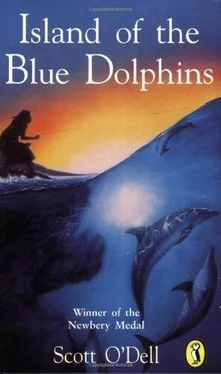The men of our tribe, except Nanko and Chief Matasaip, were already on the ship. My brother Ramo was there too, Nanko said. He had run on ahead after I had told him that he could not go back to the village for his spear. Nanko said that he had jumped into the first boat that left the cove.
Matasaip divided the women into two groups. Then the boats were pushed into the water, and while they bobbed about we scrambled into them as best we could.
The cove was partly sheltered from the wind, but as soon as we went through the passage between the rocks and into the sea, great waves struck us. There was much confusion. Spray flew, the white men shouted at each other. The boat pitched so wildly that in one breath you could see the ship and in the next breath it had gone. Yet we came to it at last and somehow were able to climb on to the deck.
The ship was large, many times the size of our biggest canoes. It had two tall masts and between them stood a young man with blue eyes and a black beard. He was the chieftain of the white men, for he began to shout orders which they quickly obeyed. Sails rose on the tall masts and two of the men began to pull on the rope that held the anchor.
I called to my brother, knowing that he was very curious and therefore would be in the way of the men who were working. The wind drowned my voice and he did not answer. The deck was so crowded that it was hard to move, but I went from one end of it to the other, calling his name. Still there was no answer. No one had seen him.
At last I found Nanko.
I was overcome with fear. ‘Where is my brother?’ I cried.
He repeated what he had told me on the beach, but as he spoke Ulape who stood beside him pointed towards the island. I looked out across the deck and the sea. There, running along the cliff, the fishing spear held over his head, was Ramo.
The sails had filled and the ship was now moving slowly away. Everyone was looking towards the cliff, even the white men. I ran to one of them and pointed, but he shook his head and turned from me. The ship began to move faster. Against my will, I screamed.
Chief Matasaip grasped my arm.
‘We cannot wait for Ramo,’ he said. 'If we do, the ship will be driven on the rocks.’
‘We must!’ I shouted. ‘We must!’
‘The ship will come back for him on another day,’ Matasaip said. ‘He will be safe. There is food for him to eat and water to drink and places to sleep.’
‘No,’ I cried.
Matasaip's face was like stone. He was not listening. I cried out once more, but my voice was lost in the howling wind. People gathered around me, saying again what Matasaip had said, yet I was not comforted by their words.
Ramo had disappeared from the cliff and I knew that he was now running along the trail that led to the beach.
The ship began to circle the kelp bed and I thought surely that it was going to return to the shore. I held my breath, waiting. Then slowly its direction changed. It pointed towards the east. At that moment I walked across the deck and, though many hands tried to hold me back, flung myself into the sea.
A wave passed over my head and I went down and down until I thought I would never behold the day again. The ship was far away when I rose. Only the sails showed through the spray. I was still clutching the basket that held all of my things, but it was very heavy and I realized that I could not swim with it in my arms. Letting it sink, I started off towards the shore.
I could barely see the two rocks that guarded the entrance to Coral Cove, but I was not fearful. Many times I had swum farther than this, although not in a storm.
I kept thinking over and over as I swam how I would punish Ramo when I reached the shore, yet when I felt the sand under my feet and saw him standing at the edge of the waves, holding his fishing spear and looking so forlorn, I forgot all those things I planned to do. Instead I fell to my knees and put my arms around him.
The ship had disappeared.
‘When will it come back?’ Ramo asked. There were tears in his eyes.
‘Soon,’ I said.
The only thing that made me angry was that my beautiful skirt of yucca fibres, which I had worked on so long and carefully, was ruined.
The wind blew strong as we climbed the trail, covering the mesa with sand that sifted around our legs and shut out the sky. Since it was not possible to find our way back, we took shelter among some rocks. We stayed there until night fell. Then the wind lessened and the moon came out and by its light we reached the village.
The huts looked like ghosts in the cold light. As we neared them I heard a strange sound like that of running feet. I thought that it was a sound made by the wind, but when we came closer I saw dozens of wild dogs scurrying around through the huts. They ran from us, snarling as they went.
The pack must have slunk into the village soon after we left, for it had gorged itself upon the abalone we had not taken. It had gone everywhere searching out food, and Ramo and I had to look hard to find enough for our supper. While we ate beside a small fire I could hear the dogs on the hill not far away, and through the night their howls came to me on the wind. But when the sun rose and I went out of the hut, the pack trotted off towards its lair which was at the north side of the island, in a large cave.
That day we spent gathering food. The wind blew and the waves crashed against the shore so that we could not go out on the rocks. I gathered gull eggs on the cliff and Ramo speared a string of small fish in one of the tide pools. He brought them home, walking proudly with the string over his back. He felt that in this way he had made up for the trouble he had caused.
With the seeds I had gathered in a ravine, we had a plentiful meal, although I had to cook it on a flat rock. My bowls were at the bottom of the sea.
The wild dogs came again that night. Drawn by the scent of fish, they sat on the hill, barking and growling at each other. I could see the light from the fire shining in their eyes. At dawn they left.
The ocean was calm on this day and we were able to hunt abalone among the rocks. From seaweed we wove a rough basket which we filled before the sun was overhead. On the way home, carrying the abalone between us, Ramo and I stopped on the cliff. The air was clear and we could look far out to sea in the direction the ship had gone.
‘Will it come back today?’ Ramo asked.
‘It may,’ I answered him, though I did not think so. ‘More likely it will come after many suns, for the country where it has gone is far off.’
Ramo looked up at me. His black eyes shone.
‘I do not care if the ship never comes,’ he said.
‘Why do you say this?’ I asked him.
Ramo thought, making a hole in the earth with the point of his spear.
‘Why?’ I asked again.
‘Because I like it here with you,’ he said. ‘It is more fun than when the others were here. Tomorrow I am going to where the canoes are hidden and bring one back to Coral Cove. We will use it to fish in and to go looking around the island.’
‘They are too heavy for you to put into the water.’
‘You will see.’
Ramo threw out his chest. Around his neck was a string of sea-elephant teeth which someone had left behind. It was much too large for him and the teeth were broken, but they rattled as he thrust the spear down between us.
‘You forget that I am the son of Chowig,’ he said.
‘I do not forget,’ I answered. ‘But you are a small son. Someday you will be tall and strong and then you will be able to handle a big canoe.’
‘I am the son of Chowig,’ he said again, and as he spoke his eyes suddenly grew large. ‘I am his son and since he is dead I have taken his place. I am now Chief of Ghalas-at. All my wishes must be obeyed.’
Читать дальше











